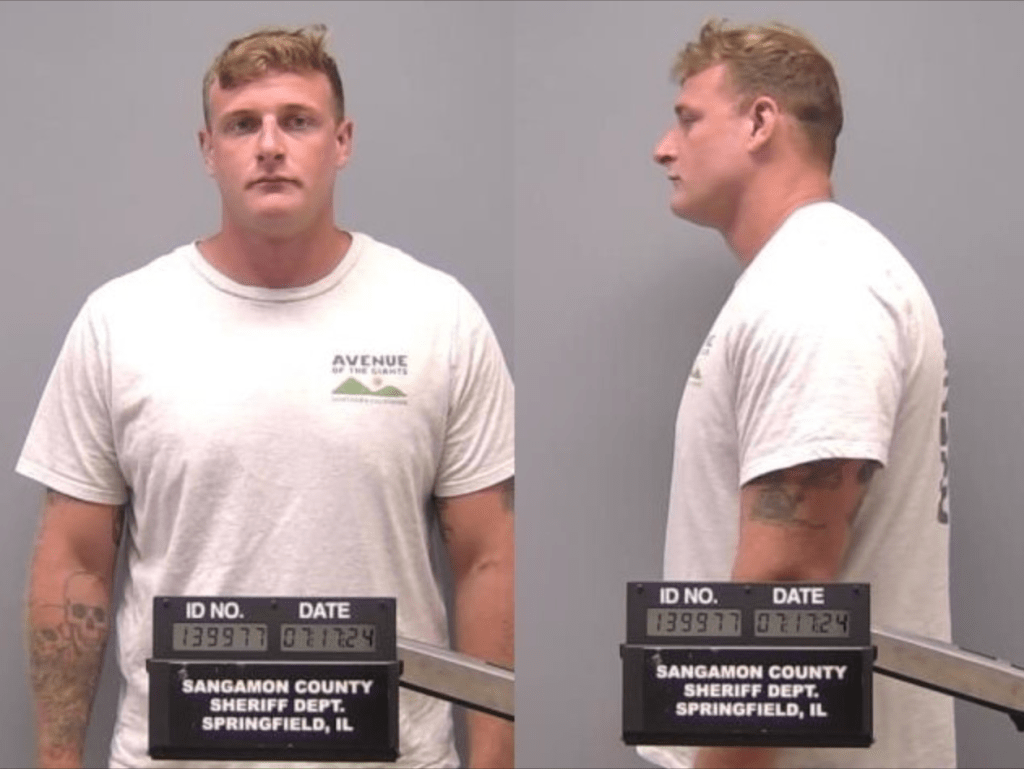-
 play_arrow
play_arrow
Foxy 106.9
-
 play_arrow
play_arrow
Dr. Candice Carter-Oliver Interview
Justice For Sonya Massey: Activists Demand Killer Ex-Cop Stay In Jail After Sean Grayson’s Pre-Trial Release


Sean Patrick Grayson. | Source: Sangamon County Jail
Last week, a Fourth District Appellate Court decision overturned a lower court’s ruling that Sangamon County Sheriff’s Deputy Sean P. Grayson, who is charged with first-degree murder after shooting Sonya Massey to death in her home on July 6, should be remanded until trial. To the dismay of activists and Sangamon County residents who are demanding justice for Massey, the appellate court granted Grayson pre-trial release, according to the State Journal-Register.
However, on Monday, State’s Attorney John Milhiser filed a motion to stay the appellate court’s ruling. Grayson’s attorneys swiftly filed an objection to the motion. Now, Circuit Court Presiding Judge Ryan Cadagin, who had ruled twice that Grayson remain in lockup under the Pre-Trial Fairness Act, will meet Friday with prosecutors and defense attorneys for a hearing on the “least restrictive conditions” of Grayson’s release.
MORE: DOJ Launches Federal Civil Rights Investigation Into The Killing Of Sonya Massey
Here’s a little background on the appellate court decision via the Journal-Register:
The appellate court opinion was written by Justice Eugene Doherty. Justices James A. Knecht and Craig H. DeArmond joined in the opinion.
It took exception with Cadagin’s ruling that “no conditions of release would be adequate to mitigate the threat (Grayson) posed to the safety of the community.”
The trial court’s focus on Grayson’s failings as a law enforcement officer, the opinion noted, “distracted from the central question of how to address any risk he posed after being stripped of his office.”
Conditions for Grayson’s release could include home confinement and some sort of monitoring process.
Tiara Standage, who has worked with the Massey and helped stage Monday’s protest, said it was “ridiculous” even considering the possibility of releasing Grayson.
“It’s a slap in the face to the Massey family,” said Standage, outside of the courtroom. “They’re spending their first holidays without their loved one and Sean Grayson could possibly spend his holidays with his family.
“That’s unfair.”

The Rev. Al Sharpton speaks alongside family members of Sonya Massey during a press conference at New Mount Pilgrim Church on July 30, 2024, in Chicago, Illinois. | Source: Scott Olson / Getty
After the hearing, which took place last Wednesday, Massey’s father, James Wilburn, also called the ruling to grant Grayson pre-trial release “a serious miscarriage of justice,” and local activists like Ken Pacha of Springfield, Illinois, have argued that a first-degree murder charge should be an automatic disqualifier for release from jail.
“It makes a mockery of the Safe-T Act,” Pacha said outside the courtroom after last week’s hearing. She also argued that taking Grayson’s badge away doesn’t make him less of a threat to the public if he’s walking free until his trial starts.
“Why would I believe that once your authoritative oversight has been removed that you’re going to be more responsible?” Pacha said. “That doesn’t make any sense at all.”
What happened to Sonya Massey?
On July 6, Grayson and another officer came to Massey’s home after she called 911 to report a possible intruder. Police body camera footage released in September showed Massey speaking calmly with the officer, first at her front door and then in her living room as she sat on the couch. Things took a turn after the deputies noticed a pot of water boiling on the stove and sent Massey to the kitchen to remove it. As she removed the pot, she, possibly jokingly, told the cops, “I rebuke you in the name of Jesus,” and, despite the footage not showing clearly that she made any threatening moves toward the officers, Grayson shot her within seconds.
Many have called it one of the more egregious instances of fatal police brutality since the murder of George Floyd, and its easily arguable that a civilian could never commit a killing like this, be charged with first degree murder, and still be allowed to go free until trial.
SEE ALSO:
Examining Sonya Massey’s Final Words: What Does ‘I Rebuke You in the Name of Jesus’ Actually Mean?

-
4942 Delmar Blvd.
St. Louis, MO. 63108
CONTACT US
- 314-782-FOXY (3699) OFC
- 314-944-1069 REQUEST LINE
- info@foxy1069.com
- ADVERTISING INQUIRIES
- scott@foxy1069.com
FOXY QR CODE



